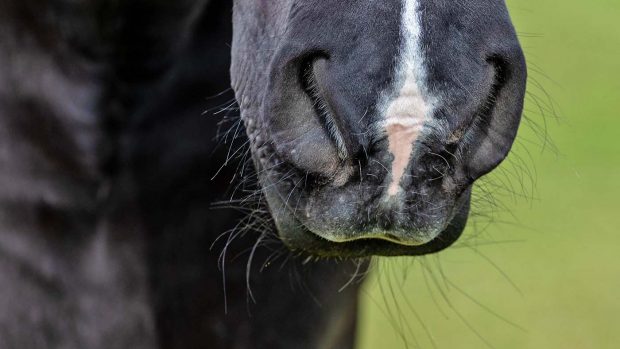Obesity may contribute to shortened careers – and lives – of horses and ponies, and its prevalence is a “grave concern”.
These are the conclusions of a review of the effects of excess weight on equine exercise performance, conducted by Shannon Pratt-Phillips and Ahmad Munjizun, of the department of animal science, North Carolina State University, and published this week in Animals.
“There is ample research describing the increased risk of health concerns associated with equine obesity, including insulin dysregulation and laminitis,” the paper states.
“For athletes, the negative effect of weight carriage is well documented in racing thoroughbreds (i.e., handicapping with weight) and rider weight has been shown to impact the workload of ridden horses and to some degree their gait and movement.
“In many groups of competitive and athletic horses and ponies, obesity is still relatively common. Therefore, these animals not only are at risk of metabolic disease, but also must perform at a higher workload due to the weight of their adipose tissue. Excess body weight has been documented to affect gait quality, cause heat stress and is expected to hasten the incidence of arthritis development. Meanwhile, many equine event judges appear to favour the look of adiposity in competitive animals. This potentially rewards horses and ponies that are at higher risk of disease and reinforces the owner’s decisions to keep their animals fat.
“This is a welfare concern for these animals and is of grave concern for the equine industry.”
The authors, who reviewed a large number of studies in this area, note that the potential negative effects of carrying extra weight on horses’ performance are well known, referencing not only handicapping of racehorses, which was established in the 19th century, but also research proving that carrying extra weight increases horses’ workload.
“At the extreme, there are reports of welfare concerns regarding work efforts and strain on horses carrying excess weight (as riders or other loads),” the authors state. “To this end, it would seem that additional weight carried by an overweight or obese horse as excess body fat would also contribute to towards a higher workload and potentially have a negative impact on athletic performance. The excess adipose tissue may also be detrimental to overall health and exercise performance directly through the production of inflammatory proteins and their effects on the body. A large number of companion and performance horses and ponies are considered overweight or obese and are, therefore, at risk of disease and likely also have impaired performance.”
Among the papers considered in the review was research into the incidence of equine obesity, which has been reported to reach 22–50% in the US and 31.2–72% in the UK. The authors cite studies showing that owners often do not recognise that their horses are overweight, and tend to underestimate their body condition scores.
“Obesity may be more likely and understandable in leisure horses that may be overfed calories due to their lower level of activity and, therefore, lower caloric requirements,” the authors state. They added that excess weight has been reported in different disciplines of competition, and that studies indicate judges may favour excess weight, so owners keep horses fatter to “give them an edge” in the ring.
“It is likely, however, that adiposity will ultimately not just shorten a horse’s lifespan, but may also negatively affect their athletic career,” the paper states.
The authors add that excess equine weight is linked to conditions including equine metabolic syndrome, laminitis and low-grade inflammation. It can also cause build-up of fat around the kidneys and heart and may affect reproduction. The paper states that the increased risk of arthritis in overweight horses may be owing to increased load on the joints but could also be related to pro-inflammatory compounds produced by the fatty tissue.
“Therefore, feeding to keep horses at a leaner body condition may lengthen their athletic careers and prolong their lives,” the authors state. They found that excess weight may “significantly affect equine performance”, and have an impact on a horse’s movement. The insulating properties of fat may also have a negative impact on a horse’s ability to cool itself.
“Despite the insurmountable recognition of major health consequences of obesity in our horses, several large research studies have shown that obesity is prevalent among our equine populations,” the report concludes. “Excessive weight carriage – as body fat and/or rider weight – appears to increase the workload of horses and may pose excessive strain on a horse’s limbs during exercise. Excessive weight carriage as fat further increases the likelihood of additional negative health impacts such as metabolic disease, laminitis, inflammation, cardiovascular changes and/or arthritis. Therefore, excessive adiposity may contribute to potentially shortened careers and/or lives of these equine partners. The current trends in many equine disciplines that appear to reward excess condition (fat) and the increased overall incidence of obesity in our equine populations is of grave concern.”
You might also be interested in:

Concerns over showing judges’ ability to identify overweight and obese horses

‘It’s not fat-shaming, it’s horse welfare’: saddle fitter’s warning on damaging effects of excess rider weight
“These people are often good riders who do everything for their horses, except the one thing that would truly help

Subscribe to Horse & Hound magazine today – and enjoy unlimited website access all year round
Horse & Hound magazine, out every Thursday, is packed with all the latest news and reports, as well as interviews, specials, nostalgia, vet and training advice. Find how you can enjoy the magazine delivered to your door every week, plus options to upgrade your subscription to access our online service that brings you breaking news and reports as well as other benefits.




